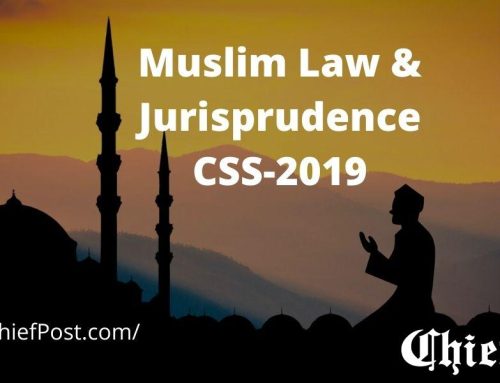
Muslim Law and Jurisprudence 2020 — CSS Past Paper
FEDERAL PUBLIC SERVICE COMMISSION
COMPETITIVE EXAMINATION-2020 FOR RECRUITMENT TO POSTS IN BS-17
UNDER THE FEDERAL GOVERNMENT
Muslim Law and Jurisprudence
TIME ALLOWED: THREE HOURS
PART-I(MCQS): MAXIMUM 30 MINUTES
PART-I (MCQS) MAXIMUM MARKS = 20
PART-II MAXIMUM MARKS = 80
NOTE:
- (i) Part-II is to be attempted on the separate Answer Book.
- (ii) Attempt ONLY FOUR questions from PART-II. ALL questions carry EQUAL marks.
- (iii) All the parts (if any) of each Question must be attempted at one place instead of at different places.
- (iv) Candidate must write Q. No. in the Answer Book in accordance with Q. No. in the Q.Paper.
- (v) No Page/Space be left blank between the answers. All the blank pages of Answer Book must be crossed.
- (vi) Extra attempt of any question or any part of the attempted question will not be considered.
PART-II
Q. No. 2. Explain naskh (abrogation) in the light of the definitions of classic Muslim jurists. Also describe its role in the texts of Islamic Shari‘ah. (20)
Q. No. 3. What is the Hanafi-Shafit’ controversy over the doctrine of Istihsan (uristic preference)? Discuss its main points. (20)
Q. No. 4. What is meant by “missing person” in the law of inheritance? What would be the effect on the distribution of estate of a praepositus when one or more of his heirs are missing person? (20)
Q. No. 5. Define gharar. It is said that insurance is a modern contract of gharar and is incompatible with the injunctions of Islamic law. Argue. (20)
Q. No. 6. A group of modern scholars asserts that Islamic law imposes on divorcing husband to pay maintenance to the divorced wife for the rest of her life or until she marries someone else. What is your opinion with sound arguments? (20)
Q. No. 7. Discuss the Islamic view on imprisonment as a form of punishment. (20)
Q. No. 8. Write notes on any TWO of the following topics: (20)
(a) Nushuz
(b) Mahr al-Mith’l (Proper dower)
(c) Idtirar (necessity) in Islamic law
**********










